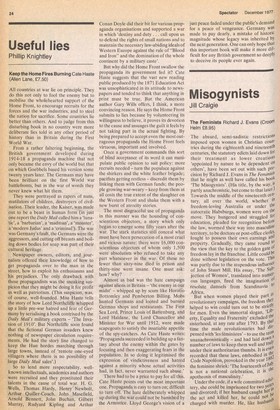Useful lies
Phillip Knightley
Keep the Home Fires Burning Cate Haste (Allen Lane, £7.50) All countries at war lie on principle. They do this not only to fool the enemy but to mobilise the wholehearted support of the Home Front, to encourage recruits for the forces and the war industries, and to steel the nation for sacrifice. Some countries lie better than others. And to judge from this disturbing book in no country were more deliberate lies told in any other period of history than in Britain during the First World War, From a rather faltering beginning, the British government developed during 1914-18 a propaganda machine that not only became the envy of the world but that on which Goebbels based his version some twenty years later. The Germans may have been brilliant on the first World war battlefronts, but in the war of words they never knew what hit them.
They were portrayed as rapers of nuns, mutilators of children, destroyers of civil isation. Their leader, the Kaiser, was made out to be a beast in human form (in just one report the Daily Mail called him a 'luna tic', a 'barbarian', a 'madman', a 'monster', a 'modern Judas' and a 'criminal). The wat was Germany's fault, the Germans were the aggressors, and cutting off breasts and boiling down bodies for soap was part of their cultural heritage.
Newspaper owners, editors, and journalists offered their knowledge of how to get propaganda over to the man in the street, how to exploit his enthusiasms and his prejudices. The only drawback with these propagandists was the sneaking sus picion that they might be doing it for profit as well as patriotism. (This suspicion, was, of course, well-founded. Miss Haste tells the story of how Lord Northcliffe whipped up a little pre-war hatred and fear of Ger many by serialising a book contrived by the Daily Mail's military experts — 'The Invasion of 1910'. But Northcliffe soon found that the fictional German invaders knew nothing of newspaper circulation requirements. He had the story line changed to keep the Hun hordes marching through large towns, instead of 'remote one-eyed villagers where there is no possibility of large Daily Mail sales'.) So to lend more respectability, wellknown intellectuals, academics and authors were recruited and they prostituted their talents in the cause of total war. H. G. Wells, Thomas Hardy, Henry Newbolt, Arthur Quiller-Couch, John Masefield, Arnold Bennett, John Buchan, Gilbert Murray, Rudyard Kipling and Arthur Conan Doyle did their bit for various propaganda organisations and supported a war in which 'destiny and duty . . . call upon us to defend the rights of small nations and to maintain the necessary law-abiding ideals of Western Europe against the rule of "Blood and Iron" and the domination of the whole continent by a military caste'.
But why did the Home Front swallow the propaganda its government fed it? Cate Haste suggests that the vast new reading public produced by the 1871 Education Act was unsophisticated in its attitude to newspapers and tended to think that anything in print must be true. But the American author Gary Wills offers, I think, a more convincing reason. He says the Home Front submits to lies because by volunteering its willingness to believe, it proves its devotion to the cause and assuages the guilt it feels by not taking part in the actual fighting. By being prepared to accept even the most outrageous propaganda the Home Front feels virtuous, important and involved.
Once a.government commands this sort of blind acceptance of its word it can manipulate public opinion to suit policy: more recruits needed — turn the populace against the shirkers and the white feather brigade; pacifists getting restless — discredit them by linking them with German funds; the people growing war-weary — keep from them at all costs the true extent of the slaughter on the Western Front and shake them with a new burst of atrocity stories.
The most disgraceful use of propaganda in this manner was the hounding of conscientious objectors, a story which only began to emerge some fifty years after the war. The stark statistics still conceal what must have been persecution of a most cruel and vicious nature: there were 16,000 conscientious objectors of whom only 1,500 were absolutists who refused to take any part whatsoever in the war. Of these no fewer than sixty-nine died in prison and thirty-nine went insane. One must ask: how? why?
Almost as bad was the hate campaign against aliens in Britain — 'the enemy in our midst' — whipped up by scum like Horatio Bottomley and Pemberton Billing. Mobs hunted Germans and looted and burned German shops and restaurants. The First Sea Lord, Prince Louis of Battenburg, and Lord Haldane, the Lord Chancellor and Minister for War until 1912, were made scapegoats to satisfy the insatiable appetite of the spy-catchers. As Cate Haste writes: 'Propaganda succeeded in building up a fantasy about the enemy within the gates by focusing and then exaggerating fears in the population. In so doing it legitimised the expression of vindictiveness and hatred against a minority whose actual activities had, in fact, never warranted such abuse.'
There had to be a price to pay for all this. Cate Haste points out the most important one. Propaganda is easy to turn on; difficult to turn off. The hate deliberately whipped up during the war could not be banished by the Armistice, Lloyd George's vision of a just peace faded under the public's demand for a peace of vengeance. Germany was made to pay dearly, a mistake of historic magnitude whose legacy was inherited by the next generation. One can only hope that this important book will make it more difficult for any British government so deeplY to deceive its people ever again.










































 Previous page
Previous page